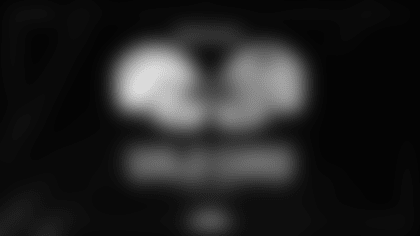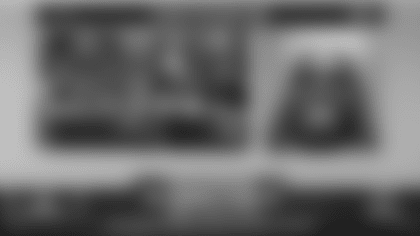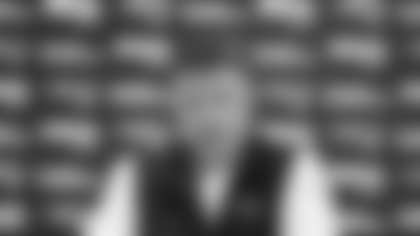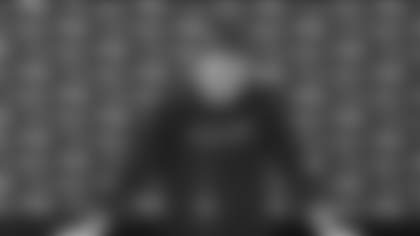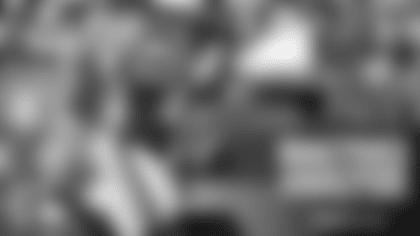BB: It was a good day for us yesterday. I talked to Coach [Bill] O'Brien again this morning. [It'll be] kind of similar, a little different, but pretty similar format today, really good work. The Texans – they're a good football team, obviously, very well-coached and good fundamentally. There are certainly a lot of things we corrected from yesterday and need to work on, but it was good work. We got better, we improved and we've still got a long way to go. But it was a good day for us, so we're looking forward to today here.
Q: How similar was their tempo at practice to what you're team is used to?
BB: Yeah, probably pretty close. I don't think we really had any issues out there. We tried to keep the players on their feet, competing hard but staying up. Both teams gave good effort. There were some good competitive drills. Yeah, I think the tempo was good.
Q: How hard is it to coach accuracy for a quarterback, or is it even a teachable trait at all?
BB: Well, I think you can improve it. It's like a lot of things – you can improve them. Like you can improve speed, you can improve strength, but I mean there are sometimes limits based on mechanics. We try to work to improve all of our fundamentals no matter what they are. Some players have a higher ceiling than others.
Q: What are your thoughts on how Tom Brady has been able to maintain such a high level of performance this late in his career?
BB: Well, I think that's probably a better question for Tom. He's had a remarkable career performance and consistency. He's done a great job for us. We're lucky to have him.
Q: You seem to have some fairly famous coaching guests here today [Tom Crean and Tony La Russa]. Are you picking their brains at all?
BB: Yeah, we brought in a couple of big righties from the bullpen that can really throw hard and close it.
Q: How much have you enjoyed your friendship with Tony La Russa over the years?
BB: Yeah, Tony's been a great friend. Buzz Bissinger, who wrote his book, and I went to high school together so we have some mutual friends. It's been great. My relationship with Tony has been great. I've learned a lot from somebody as accomplished as he is in another sport. I'll never forget the time he let me get in the dugout with him for an exhibition game. Baseball – it seems like just throw it and hit it but there's a lot more to it than that. I saw just how much there is on every single pitch and the focus, concentration, all of that. Plus Tony has a lot of Spanish speaking guys. He can speak Spanish, so I might be in trouble in baseball.
Q: Tony La Russa was sort of ahead of his time in regards to how he used his bullpen and so forth. Could you relate to him at all from that standpoint of trying to be forward-thinking in your sport?
BB: Yeah, absolutely. Again, different sports but Tony is very progressive. He had a great career as a manager, won a couple thousand games. I can't imagine what that's like but it must be pretty good. But yeah, he's, again, we've talked a lot about coaching teams, coaching players, dealing with different situations. He's been in a lot of big games, a lot of championships, World Series, things like that, different organizations. Yeah, he's helped me a lot and given me a lot of insight.
Q: What were your first impressions of Tom Savage and Deshaun Watson yesterday in practice?
BB: Again, the Texans have a lot of good players. They're a very talented team. Honestly, I'm just trying to focus more on getting our team to perform as well as they can, trying to coach them to the best of my ability. I know Coach O'Brien is doing the same with his team. Really this is more about us getting better than spending a lot of time trying to critique everybody on the other side of the ball. We've got enough to work on on our side.
Q: Could you tell that Mike Vrabel would become a successful football coach due to how he was as a player?
BB: Mike had a lot of great qualities as a player, so yeah, no surprise. Mike played defense. He played a lot of positions on defense. He played everything in the kicking game and also did a lot for us on offense, playing tight end in short-yardage situations. He could call signals, he had great leadership, was a multi-year captain, so his leadership, his presence, his communication, awareness, situational awareness in addition to just being a good football player, but those things were traits that carried over into coaching. And Mike's one of the physically and mentally toughest players I've ever coached, so I'm sure that will serve him well in this profession, too. There's times when you need that.
Q: Basketball coach Tom Crean is a guest here today, as well. What has your relationship with him been like?
BB: Yeah, you know, I've had an opportunity to spend a lot of time with Tom, watched him at Indiana. He allowed me to kind of watch practice and spend time with his organization, with his team. Again, different sport but I learned a lot from his organization. We speak pretty frequently. Different motivations, teachings, [but] coaching is coaching, even though the sport is different. Players are players, and there are different things you can do to help them. He is a very progressive guy.
Q: Have you ever taken a drill you've seen another team working on and adapted it to your own team's practice routine?
BB: Yeah, we sure do. Sometimes drills or if we're involved in them, but sometimes even just watching another team do an individual drill or do something in their part of the practice which is separate from ours sometimes, sure, you can pick up something – a coaching point, or something that they do. A lot of times you're giving the same message, but if you can say it differently or do it a little bit differently, it has a little more impact than just doing the same thing over, and over and over again, although there is a lot to be said for that, too. Yeah, picking up a new way or a new technique to do something that you believe in or that's a strong fundamental for you is certainly good.
Q: Could you elaborate on what Romeo Crennel has meant to you throughout your coaching career?
BB: Well, Romeo and I started together at the Giants in special teams, so he and I coached special teams together and then we coached defensively together through 1990. We worked at the Patriots together, then another team, and then back with the Patriots in 2001. I've relied on him through the years, both with our team when I worked with him, but even at times outside when we could help each other and it wasn't a conflict in competitiveness. He's helped me with a lot of things. I've learned a lot from the way he handles players, teaches, the fundamentals that he teaches, his preparation. Romeo works hard, he's very well prepared, a sound football coach. He doesn't necessarily try to out-scheme everybody, but his fundamentals and the basics and things you need to do to have a good football team and win are important. When I was in New England in 2001 when Coach [Dick] Rehbein died in preseason, Charlie [Weiss] and I handled the offense and kind of handled the quarterbacks there. I turned the whole defense over to Romeo and that was a great year for us defensively in 2001. Examples like that where I've really leaned heavily on him and he always came through. [He's] a really good football coach, a good person and did a great job of bringing along some of our younger coaches, coaches like Josh McDaniels and Brian Daboll, guys like that, that were on our staff that he taught and helped teach to become great football coaches who have carried on his legacy and many of the fundamentals and beliefs he has have transferred to them.
Q: We saw Jeff Hostetler out here at practice yesterday. How would you describe him as a player?
BB: Jeff had a very unusual career. He was a high draft choice, a very productive player in college. At the Giants we had another good quarterback so he wasn't really able to get on the field at quarterback, so even though he eventually had a lot of success at that position, particularly in the 1990 season when Phil [Simms] got hurt and he led us to the Super Bowl XXV championship, when you look back earlier on Jeff's career, he blocked a punt, he caught a pass, he did those things before he ever threw a pass in the league. I think that speaks to his versatility, his athleticism and really his ability to compete and get on the field. When there wasn't a role for him in his primary position, he found other roles and ways to contribute to the team. Jeff's really a tough kid. Again, went on to have a great career, obviously, with the Giants and then later with the Raiders so he was always a hard guy to compete against. You don't see a lot of quarterbacks come in, especially like that, and have the kind of career that he had and do other things outside of play quarterback. That was very resourceful by Coach [Bill] Parcells to get that, to see that. Ray Lucas is another guy who did that. Bill got that from Ray. It was certainly one of the things I learned from Bill about being resourceful and taking advantage of the skills of the players that are on your roster and using them however you can use them to help you win. Jeff, obviously, was a great quarterback but the way he started his career, I think that's a great lesson to all young players and I've certainly shared that with our team. It was a great example of the teamwork that we had at the Giants in those years.
Q: Is there an expectation that Dont'a Hightower should catch up pretty quickly when he returns to action because he has been in the system for five years now?
BB: Well, every year is a new year for all of us. We all have to go through the process of getting our performance level up to the highest that we can in this particular season. We all face that challenge, every player and every coach. A lot of guys are in different situations and different circumstances. We all have to go through the same process, whatever those circumstances are. Dont'a is working hard. He's doing what he can do and when he's ready to do more, which he has already this year, then he'll do more and he'll move ahead when he's ready. We'll just have to see what that timeframe brings.
Q: Yesterday you gave your team a lesson about the Greenbrier and all of the history surrounding it. What have you seen your team gain from this experience from a team-building standpoint?
BB: Well, anytime you travel on the road as a team, particularly to a location like this, it gives your team an opportunity to form closer bonds and do things together, experience things together that are a little bit different than when you're at home and everybody has a home to go home to. Here our home is a very nice one at the Greenbrier, but we're all together so it gives us all an opportunity – coaches, players and the intermingling of the two, other staff members – to know each other a little better, work together. Certainly the history and what [Governor of West Virginia] Mr. [Jim] Justice did last year, I don't know how you really could give a better example of the teamwork and the unselfishness that he showed during the floods to take in so many people from these communities, to feed them, to give them shelter, to provide medical assistance, to reach out and help people who needed help in a time that they needed it. That's the kind of teamwork, unselfishness and sacrifice that we all want to have in our lives and have on our teams. This is a great example for all of us in our organization, players and coaches, to see and appreciate. It's a great lesson to be here on a number of levels.
Q: Is it more difficult for some of the newer guys who have missed time to get acclimated to the system once they finally return to the field?
BB: Yeah, well that's one of the challenges of training camp. No pads in the spring so you only have so many padded practices and preseason games at this time of year. Each one that's missed is an opportunity to improve on the field, but what we can't do is let what we can do take away from what we can't do. The things that we can do in terms of training or whatever drills or learning experience we can gain, we have to try to gain as much as we can, and then when the opportunity comes to do the things that we can't do, we have to be able to take advantage of that. Look, this is not the first time a player has ever missed a practice in training camp, so let's not act like this is an historical event. Every team deals with it every year, but you do the best you can with it. You work through that players individual circumstances and where your team is and you do the best that you can with the opportunities that you have.


